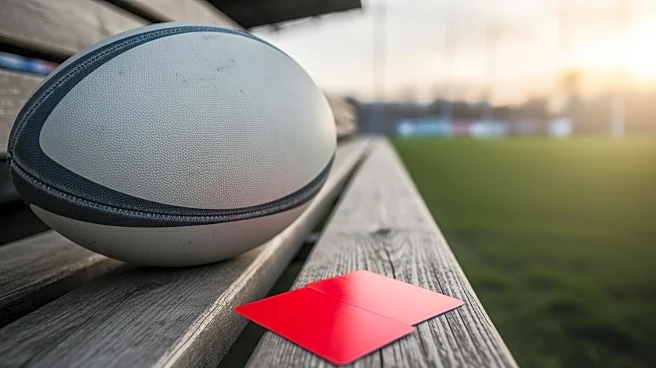What's Happening?
The South African rugby team, known as the Springboks, is facing challenges during their European tour due to consecutive red cards issued to their players. In a recent match against Italy in Turin, lock Franco Mostert was red-carded in the 12th minute
for a high tackle, forcing the team to play with 14 men for nearly 70 minutes. Despite this setback, the Springboks managed to secure a 32-14 victory. This incident follows a similar situation from the previous week when another lock, Lood de Jager, was red-carded against France for a shoulder-to-head tackle. De Jager's suspension has ruled him out for the remainder of the tour. South Africa's coach, Rassie Erasmus, expressed frustration over the repeated red cards, emphasizing the difficulty in coaching players to avoid head contact, especially for taller players.
Why It's Important?
The repeated issuance of red cards to key players poses a significant challenge for the South African rugby team, impacting their strategy and player morale. Playing with fewer players can strain the team's resources and affect their performance in crucial matches. The situation highlights the importance of adhering to safety regulations in sports, particularly concerning head contact, which is a major focus in rugby to prevent injuries. The team's ability to adapt and still secure victories demonstrates resilience but also underscores the need for improved training techniques to avoid such penalties. The broader implications include potential changes in coaching strategies and increased scrutiny on player conduct during matches.
What's Next?
The Springboks will need to reassess their approach to tackling and player safety to prevent further red cards in upcoming matches. Coach Rassie Erasmus may implement new training protocols to ensure players can effectively avoid head contact, especially for taller players who face unique challenges. The team will continue their European tour, and their ability to adapt to these challenges will be crucial for their success. Stakeholders, including rugby officials and sports analysts, may closely monitor the team's performance and disciplinary actions, potentially influencing future regulations and coaching methods in the sport.
Beyond the Headlines
The issue of red cards in rugby not only affects the immediate performance of teams but also raises ethical and safety concerns within the sport. The emphasis on player safety and the prevention of head injuries is a critical aspect of rugby's evolution, reflecting broader societal concerns about sports-related injuries. The Springboks' situation may contribute to ongoing discussions about the balance between competitive play and player welfare, potentially leading to long-term changes in how the sport is played and regulated.

















